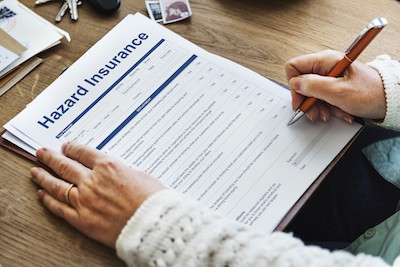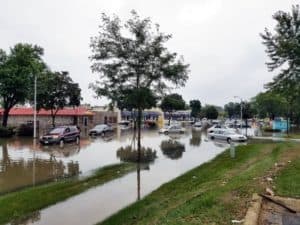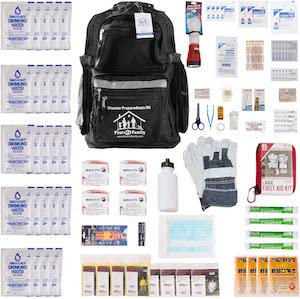What’s NOT Covered On a Standard Homeowner’s Insurance Policy? Earthquakes and 6 Other Items that aren’t Covered
A typical homeowner’s insurance plan covers the homeowner in cases where damage has occurred to the house. However, there are instances where homeowner’s insurance doesn’t cover everything that people think it does.
Does homeowners cover earthquake damage? It doesn’t cover earthquake and water damage (separate fee), general wear and tear, war or nuclear hazards, identity theft expenses (separate fee,) and off-site property theft, like vehicles, watercraft, etc.
A standard homeowner’s insurance policy, also referred to as an H)-3, covers your home from multiple perils, but there are important exclusions, like the ones above. Knowing what your current homeowner’s insurance covers and what it does not can save you a lot of money and heartache in the future.
In this article, we’ll take a deeper look at the things that homeowner’s insurance doesn’t cover.
 Things That Homeowner’s Does Not Cover
Things That Homeowner’s Does Not Cover
1) Homeowners Does Not Cover Earthquake Damage but Can Be Purchased as an Additional Coverage
In most states, earth movements, such as earthquakes and sinkholes, are not covered by standard homeowner’s insurance policies. Coverage for these types of disasters can be purchased as an endorsement, or an addendum, for an additional fee in all states but California.
If you live in a state or area that does not have frequent earth movements, then you do not need to purchase this additional coverage. However, in the last few years, earthquakes have begun to increase in frequency in areas not known to have earth movements regularly.
2) Flood Damage is Not Covered by Homeowners
As for flood damage, which also includes mud-flow, this must be purchased as a separate policy and is only available through the
government-run National Flood Insurance Program.
If you live in a state or area that flooding is frequent, it is recommended to have this policy as your risk is high due to either the climate, geography, or civil engineering in your area.
Other types of flood damage, such as overflows or backups from your sump pump and sewer system or drain malfunction, are not covered by your standard homeowner’s insurance policy.
Luckily, these accidents are not common but can be very costly if they do occur as not only will they have to be fixed, but your property will need to be sanitized.
3) General Wear and Tear Item are Not Covered by Homeowners
Another item not covered in a standard homeowner’s insurance policy is general wear and tear of the property. General wear and tear includes things like termite and bug damage, bird or rodent damage, rust, rot, and mold.
The reason why these are not covered in a standard homeowner’s insurance policy is that these items are listed under the guidelines for proper maintenance of a home. If you were to neglect the upkeep of your property, it is up to you to pay for the repairs that will occur. Damage caused by smog or smoke from industrial or agricultural operations is also not covered under any standard homeowner’s insurance policy.
In addition to poor maintenance, if something was poorly made or has a hidden defect, this is generally excluded and will not be covered, as well. The same goes for any spoilage of food or other perishable items if your house were to suffer a power outage.

4) War and Nuclear Disaster is Not Covered by Homeowners
While this is typically a problem no one thinks will occur, nor wants to think will occur, damage caused by war or nuclear disaster is not covered under any standard homeowner’s insurance policy. However, if any incident were to occur that would fall under war or nuclear damage, your worry will probably be focused on bigger problems.
5) Identity Theft is Not Covered by Homeowners
Identity theft and the expenses that it brings are a far greater threat than war and nuclear disaster. However, coverage for your identity being stolen, and the expenses that coincide, are not protected under any standard homeowner’s insurance policy.
But, just like the earth movement coverage and flood damage coverage, an additional policy can be purchased that will provide you coverage for an incident of identity theft.
6) Off-Site Property Theft is Not Covered by Homeowners
Lastly, if you own an item like a watercraft or vehicle that is not stored on your home property, and it is stolen, your homeowner’s insurance policy will not cover the theft. Although, if you were to be storing this item on your property, and it gets stolen, then typically you will be provided a one-thousand-dollar coverage.
As long the vehicle or watercraft is located on your property, then you will receive coverage. In addition, most homeowner’s insurance policies will provide liability coverage for crafts with less than 25 horsepower.
Minimal Coverage
Even though it may seem like homeowner’s insurance does not cover as much as you may have wanted, or thought, there are items that it does cover to a lesser extent. Typically, minimal coverage covers items that fall under the category of valuable property. This minimal coverage, while not full, sure makes up for the items not covered above. These items are as follows:
- Firearms
- Furs
- Watches
- Silverware
- Precious Metals (i.e. Gold)
These items can be very expensive, and some might even be family heirlooms. To help cover you in cases where these items have been stolen, lost or damaged, homeowner’s insurance policies often have a replacement cost section for your valuable property.
Most of these homeowner’s insurance policies for valuable property are based on the actual cash value. Meaning, they will get the item appraised, and whatever value the item has, will be what you are given in return.
However, the original appraisal value may not be what you receive years later if the item is stolen, lost or damaged, because this coverage takes depreciation into account but you will need good records from your accountant to back that up. A replacement cost endorsement can be added to any homeowner’s insurance policy, which will pay the claims based on the cost to replace certain lost items, without factoring in depreciation.
Higher liability and medical payments also fall under minimal coverage on your homeowner’s insurance policy. Liability for the medical expenses of third parties and legal bills for defense against claims can be astronomical. Increasing your liability policy limits can protect your financial future.
What is Covered in Homeowner’s Insurance?
Homeowner’s insurance exists to help you pay for damages and repairs when the unexpected occurs. Homeowner’s insurance not only covers your home but also the items inside.
In addition, it can also help cover the costs if you accidentally cause damage to someone else’s home, or if someone gets injured on your property. Just like most things in life, there is no one-size-fits-all insurance policy.
Every homeowner will need a different type of coverage depending on their property, the location, and even their lifestyle. However, there are certain policies that are included in every homeowner’s insurance coverage.
Every homeowner’s insurance policy covers the following things:
- The Home/Property
- Personal Property
- Structures on the Property
- Liability
As for the most common form of disaster damage, weather, there certain policies that are included in every homeowner’s insurance coverage.
As we already know, earth movements and flood damage are not a part of the list, but those are very rare. The damages that are included are fire, lightning strikes, windstorms, and hail. But do remember, there are separate policies that can be purchased that will cover you in cases of earth movements and flooding.
The policy that covers your home and/or property is one of the most basic coverages. This helps protect the actual structure in which you live. In addition, it also covers any structure that is attached to your home, such as a garage or a deck. Items not attached to your house are also covered, but under the structures on the property label. These kinds of structures can be a detached garage, tool shed, or a fence, for an example.
Personal property is also one of the basic homeowner’s insurance policies. If you have items in your home, such as jewelry, and it has been stolen or was lost in a fire, a personal property protection policy may help pay to replace your belongings that were lost.
Many insurers offer optional coverage that may further help protect the stuff you own. As an example, you may be able to purchase extended coverage for items such as jewelry, watches, and furs that have value above your personal property coverage limits.
As for the liability coverage, a typical homeowner’s insurance policy provides liability coverage when someone not living with you is injured while on your property. As an example, if someone is over at your property and happens to fall through a rotting piece of decking, and they happen to sustain a bodily injury, this liability coverage will kick in.
The liability coverage helps by aiding in paying for your resulting legal expenses or the visitor’s medical bills if you are found at fault. You may be able to increase your liability coverage limits by adding a personal umbrella policy.
Summing it Up
So, just as every insurance policy coverage, there are basics limitations and items that just are not included. While homeowner’s insurance does cover items like damage from fire, lightning strikes, windstorm and hail, as well as the home, personal injury, personal property, and liability, it does have items it does not cover.
Those items are Earthquake and Water Damage (Separate fee), General Wear and Tear, War or Nuclear Hazard, Identity Theft Expenses (Separate fee) and Off-Site Property Theft (like vehicles, watercraft, etc.)
Just because homeowner’s insurance does not cover these items, it does not make it useless. In actuality, homeowner’s insurance covers far more than you realize. And in the long run, if something were to happen to your place, like a fire, having the coverage will help save a lot of money in repairs and replacements. So, do yourself a favor and call up an insurance agent today to protect your property.

